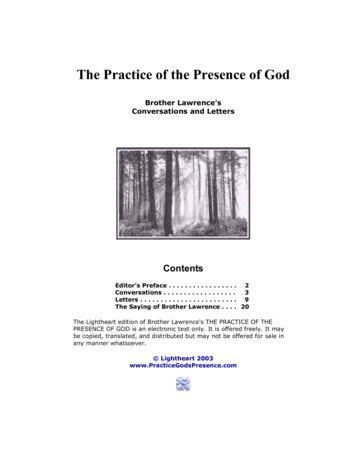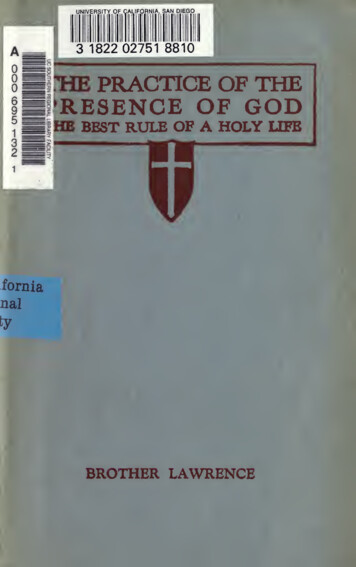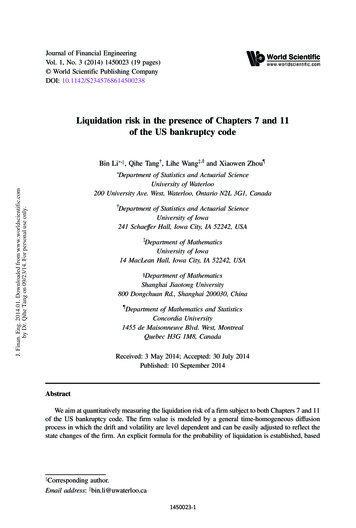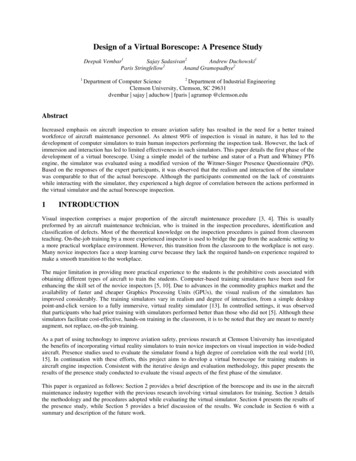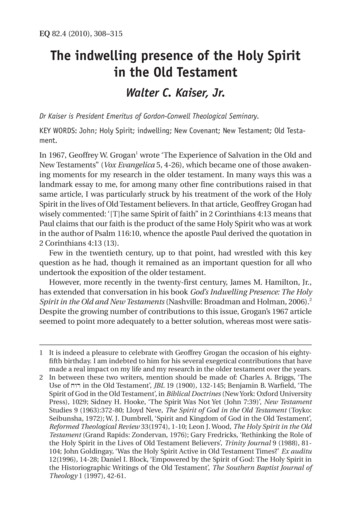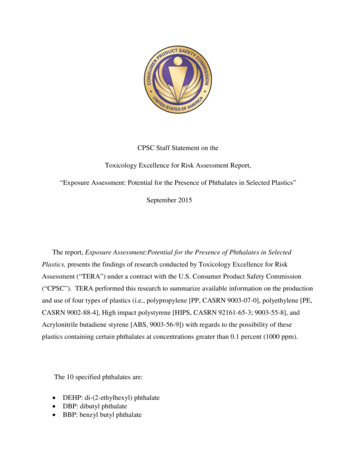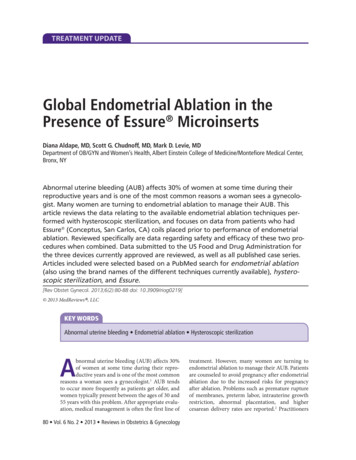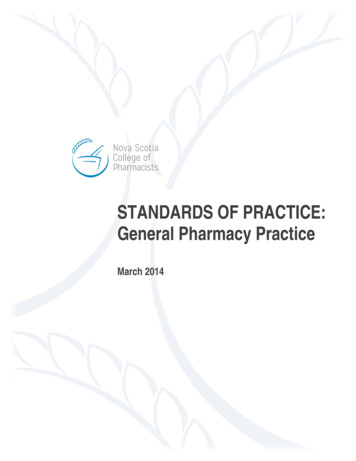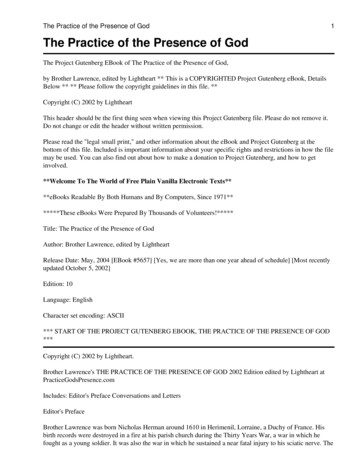
Transcription
The Practice of the Presence of God1The Practice of the Presence of GodThe Project Gutenberg EBook of The Practice of the Presence of God,by Brother Lawrence, edited by Lightheart ** This is a COPYRIGHTED Project Gutenberg eBook, DetailsBelow ** ** Please follow the copyright guidelines in this file. **Copyright (C) 2002 by LightheartThis header should be the first thing seen when viewing this Project Gutenberg file. Please do not remove it.Do not change or edit the header without written permission.Please read the "legal small print," and other information about the eBook and Project Gutenberg at thebottom of this file. Included is important information about your specific rights and restrictions in how the filemay be used. You can also find out about how to make a donation to Project Gutenberg, and how to getinvolved.**Welcome To The World of Free Plain Vanilla Electronic Texts****eBooks Readable By Both Humans and By Computers, Since 1971*******These eBooks Were Prepared By Thousands of Volunteers!*****Title: The Practice of the Presence of GodAuthor: Brother Lawrence, edited by LightheartRelease Date: May, 2004 [EBook #5657] [Yes, we are more than one year ahead of schedule] [Most recentlyupdated October 5, 2002]Edition: 10Language: EnglishCharacter set encoding: ASCII*** START OF THE PROJECT GUTENBERG EBOOK, THE PRACTICE OF THE PRESENCE OF GOD***Copyright (C) 2002 by Lightheart.Brother Lawrence's THE PRACTICE OF THE PRESENCE OF GOD 2002 Edition edited by Lightheart atPracticeGodsPresence.comIncludes: Editor's Preface Conversations and LettersEditor's PrefaceBrother Lawrence was born Nicholas Herman around 1610 in Herimenil, Lorraine, a Duchy of France. Hisbirth records were destroyed in a fire at his parish church during the Thirty Years War, a war in which hefought as a young soldier. It was also the war in which he sustained a near fatal injury to his sciatic nerve. The
The Practice of the Presence of God2injury left him quite crippled and in chronic pain for the rest of his life.The details of his early life are few and sketchy. However, we know he was educated both at home and by hisparish priest whose first name was Lawrence and who was greatly admired by the young Nicolas. He was wellread and, from an early age, drawn to a spiritual life of faith and love for God.We also know that in the years between the abrupt end of his duties as a soldier and his entry into monasticlife, he spent a period of time in the wilderness living like one of the early desert fathers. Also, prior toentering the monastery, and perhaps as preparation, he spent time as a civil servant. In his characteristic, selfdeprecating way, he mentions that he was a "footman who was clumsy and broke everything".At mid-life he entered a newly established monastery in Paris where he became the cook for the communitywhich grew to over one hundred members. After fifteen years, his duties were shifted to the sandal repair shopbut, even then, he often returned to the busy kitchen to help out.In times as troubled as today, Brother Lawrence, discovered, then followed, a pure and uncomplicated way towalk continually in God's presence. For some forty years, he lived and walked with Our Father at his side.Yet, through his own words, we learn that Brother Lawrence's first ten years were full of severe trials andchallenges.A gentle man of joyful spirit, Brother Lawrence shunned attention and the limelight, knowing that outsidedistraction "spoils all". It was not until after his death that a few of his letters were collected. Joseph deBeaufort, representative and counsel to the local archbishop, first published the letters in a small pamphlet.The following year, in a second publication which he titled, 'The Practice of the Presence of God', de Beaufortincluded, as introductory material, the content of four conversations he had with Brother Lawrence.In this small book, through letters and conversations, Brother Lawrence simply and beautifully explains howto continually walk with God - not from the head but from the heart. Brother Lawrence left the gift of a wayof life available to anyone who seeks to know God's peace and presence; that anyone, regardless of age orcircumstance, can practice -anywhere, anytime. Brother Lawrence also left the gift of a direct approach toliving in God's presence that is as practical today as it was three hundred years ago.Brother Lawrence died in 1691, having practiced God's presence for over forty years. His quiet death wasmuch like his monastic life where each day and each hour was a new beginning and a fresh commitment tolove God with all his heart.Edited by Lightheart at PracticeGodsPresence.com October 2002CONVERSATIONSIntroduction: At the time of de Beaufort's interviews, Brother Lawrence was in his late fifties. Joseph deBeaufort later commented that the crippled brother, who was then in charge of the upkeep of over onehundred pairs of sandals, was "rough in appearance but gentle in grace".First Conversation: The first time I saw Brother Lawrence was upon the 3rd of August, 1666. He told me thatGod had done him a singular favor in his conversion at the age of eighteen. During that winter, upon seeing atree stripped of its leaves and considering that within a little time the leaves would be renewed and after thatthe flowers and fruit appear, Brother Lawrence received a high view of the Providence and Power of Godwhich has never since been effaced from his soul. This view had perfectly set him loose from the world andkindled in him such a love for God, that he could not tell whether it had increased in the forty years that hehad lived since.
The Practice of the Presence of God3Brother Lawrence said he had been footman to M. Fieubert, the treasurer, and that he was a great awkwardfellow who broke everything. He finally decided to enter a monastery thinking that he would there be made tosmart for his awkwardness and the faults he would commit, and so he would sacrifice his life with itspleasures to God. But Brother Lawrence said that God had surprised him because he met with nothing butsatisfaction in that state.Brother Lawrence related that we should establish ourselves in a sense of God's Presence by continuallyconversing with Him. It was a shameful thing to quit His conversation to think of trifles and fooleries. Weshould feed and nourish our souls with high notions of God which would yield us great joy in being devotedto Him.He said we ought to quicken and enliven our faith. It was lamentable we had so little. Instead of taking faithfor the rule of their conduct, men amused themselves with trivial devotions which changed daily. He said thatfaith was sufficient to bring us to a high degree of perfection. We ought to give ourselves up to God withregard both to things temporal and spiritual and seek our satisfaction only in the fulfilling of His will. WhetherGod led us by suffering or by consolation all would be equal to a soul truly resigned.He said we need fidelity in those disruptions in the ebb and flow of prayer when God tries our love to Him.This was the time for a complete act of resignation, whereof one act alone could greatly promote our spiritualadvancement.He said that as far as the miseries and sins he heard of daily in the world, he was so far from wondering atthem, that, on the contrary, he was surprised there were not more considering the malice sinners were capableof. For his part, he prayed for them. But knowing that God could remedy the mischief they did when Hepleased, he gave himself no further trouble.Brother Lawrence said to arrive at such resignation as God requires, we should carefully watch over all thepassions that mingle in spiritual as well as temporal things. God would give light concerning those passions tothose who truly desire to serve Him.At the end of this first conversation Brother Lawrence said that if my purpose for the visit was to sincerelydiscuss how to serve God, I might come to him as often as I pleased and without any fear of beingtroublesome. If this was not the case, then I ought visit him no more.Second Conversation: Brother Lawrence told me he had always been governed by love without selfish views.Since he resolved to make the love of God the end of all his actions, he had found reasons to be well satisfiedwith his method. He was pleased when he could take up a straw from the ground for the love of God, seekingHim only, and nothing else, not even His gifts.He said he had been long troubled in mind from a certain belief that he should be damned. All the men in theworld could not have persuaded him to the contrary. This trouble of mind had lasted four years during whichtime he had suffered much.Finally he reasoned: I did not engage in a religious life but for the love of God. I have endeavored to act onlyfor Him. Whatever becomes of me, whether I be lost or saved, I will always continue to act purely for the loveof God. I shall have this good at least that till death I shall have done all that is in me to love Him. From thattime on Brother Lawrence lived his life in perfect liberty and continual joy. He placed his sins betweenhimself and God to tell Him that he did not deserve His favors yet God still continued to bestow them inabundance.Brother Lawrence said that in order to form a habit of conversing with God continually and referring all we doto Him, we must at first apply to Him with some diligence. Then, after a little care, we would find His love
The Practice of the Presence of God4inwardly excite us to it without any difficulty.He expected after the pleasant days God had given him, he would have his turn of pain and suffering. Yet hewas not uneasy about it. Knowing that, since he could do nothing of himself, God would not fail to give himthe strength to bear them.When an occasion of practicing some virtue was offered, he addressed himself to God saying, "Lord, I cannotdo this unless Thou enablest me". And then he received strength more than sufficient. When he had failed inhis duty, he only confessed his fault saying to God, "I shall never do otherwise, if You leave me to myself. Itis You who must hinder my falling and mend what is amiss." Then, after this, he gave himself no furtheruneasiness about it.Brother Lawrence said we ought to act with God in the greatest simplicity, speaking to Him frankly andplainly, and imploring His assistance in our affairs just as they happen. God never failed to grant it, as BrotherLawrence had often experienced.He said he had been lately sent into Burgundy to buy the provision of wine for the community. This was avery unwelcome task for him because he had no turn for business and because he was lame and could not goabout the boat but by rolling himself over the casks. Yet he gave himself no uneasiness about it, nor about thepurchase of the wine. He said to God, it was His business he was about, and that he afterwards found it verywell performed. He mentioned that it had turned out the same way the year before when he was sent toAuvergne.So, likewise, in his business in the kitchen (to which he had naturally a great aversion), having accustomedhimself to do everything there for the love of God and asking for His grace to do his work well, he had foundeverything easy during the fifteen years that he had been employed there. He was very pleased with the posthe was now in. Yet he was as ready to quit that as the former, since he tried to please God by doing littlethings for the love of Him in any work he did. With him the set times of prayer were not different from othertimes. He retired to pray according to the directions of his superior, but he did not need such retirement norask for it because his greatest business did not divert him from God.Since he knew his obligation to love God in all things, and as he endeavored to do so, he had no need of adirector to advise him, but he greatly needed a confessor to absolve him. He said he was very sensible of hisfaults but not discouraged by them. He confessed them to God and made no excuses. Then, he peaceablyresumed his usual practice of love and adoration.In his trouble of mind, Brother Lawrence had consulted no one. Knowing only by the light of faith that Godwas present, he contented himself with directing all his actions to Him. He did everything with a desire toplease Him and let what would come of it.He said that useless thoughts spoil all - that the mischief began there. We ought to reject them as soon as weperceived their impertinence and return to our communion with God. In the beginning he had often passed histime appointed for prayer in rejecting wandering thoughts and falling right back into them. He could neverregulate his devotion by certain methods as some do. Nevertheless, at first he had meditated for some time,but afterwards that went off in a manner that he could give no account of. Brother Lawrence emphasized thatall bodily mortifications and other exercises are useless unless they serve to arrive at the union with God bylove. He had well considered this. He found that the shortest way to go straight to God was by a continualexercise of love and doing all things for His sake.He noted that there was a great difference between the acts of the intellect and those of the will. Acts of theintellect were comparatively of little value. Acts of the will were all important. Our only business was to loveand delight ourselves in God. All possible kinds of mortification, if they were void of the love of God, could
The Practice of the Presence of God5not efface a single sin. Instead, we ought, without anxiety, to expect the pardon of our sins from the blood ofJesus Christ only endeavoring to love Him with all our hearts. And he noted that God seemed to have grantedthe greatest favors to the greatest sinners as more signal monuments of His mercy.Brother Lawrence said the greatest pains or pleasures of this world were not to be compared with what he hadexperienced of both kinds in a spiritual state. As a result he feared nothing, desiring only one thing of God that he might not offend Him. He said he carried no guilt. "When I fail in my duty, I readily acknowledge it,saying, I am used to do so. I shall never do otherwise if I am left to myself. If I fail not, then I give God thanksacknowledging that it comes from Him."Third Conversation: Brother Lawrence told me that the foundation of the spiritual life in him had been a highnotion and esteem of God in faith. When he had once well established his faith he had no other care but toreject every other thought so he might perform all his actions for the love of God. He said when sometimes hehad not thought of God for a good while he did not disquiet himself for it. Having acknowledged hiswretchedness to God, he simply returned to Him with so much the greater trust in Him.He said the trust we put in God honors Him much and draws down great graces. Also, that it was impossiblenot only that God should deceive but that He should long let a soul suffer which is perfectly resigned to Himand resolved to endure everything for His sake.Brother Lawrence often experienced the ready succors of Divine Grace. And because of his experience ofgrace, when he had business to do, he did not think of it beforehand. When it was time to do it, he found inGod, as in a clear mirror, all that was fit for him to do. When outward business diverted him a little from thethought of God a fresh remembrance coming from God invested his soul and so inflamed and transported himthat it was difficult for him to contain himself. He said he was more united to God in his outwardemployments than when he left them for devotion in retirement.Brother Lawrence said that the worst that could happen to him was to lose that sense of God which he hadenjoyed so long. Yet the goodness of God assured him He would not forsake him utterly and that He wouldgive him strength to bear whatever evil He permitted to happen to him. Brother Lawrence, therefore, said hefeared nothing. He had no occasion to consult with anybody about his state. In the past, when he hadattempted to do it, he had always come away more perplexed. Since Brother Lawrence was ready to lay downhis life for the love of God, he had no apprehension of danger.He said that perfect resignation to God was a sure way to heaven, a way in which we have always sufficientlight for our conduct. In the beginning of the spiritual life we ought to be faithful in doing our duty anddenying ourselves and then, after a time, unspeakable pleasures followed. In difficulties we need only haverecourse to Jesus Christ and beg His grace with which everything became easy.Brother Lawrence said that many do not advance in the Christian progress because they stick in penances andparticular exercises while they neglect the love of God which is the end. This appeared plainly by their worksand was the reason why we see so little solid virtue. He said there needed neither art nor science for going toGod, but only a heart resolutely determined to apply itself to nothing but Him and to love Him only.Fourth Conversation: Brother Lawrence spoke with great openness of heart concerning his manner of going toGod whereof some part is related already. He told me that all consists in one hearty renunciation of everythingwhich we are sensible does not lead to God. We might accustom ourselves to a continual conversation withHim with freedom and in simplicity. We need only to recognize God intimately present with us and addressourselves to Him every moment. We need to beg His assistance for knowing His will in things doubtful andfor rightly performing those which we plainly see He requires of us, offering them to Him before we do them,and giving Him thanks when we have completed them.
The Practice of the Presence of God6In our conversation with God we should also engage in praising, adoring, and loving Him incessantly for Hisinfinite goodness and perfection. Without being discouraged on account of our sins, we should pray for Hisgrace with a perfect confidence, as relying upon the infinite merits of our Lord. Brother Lawrence said thatGod never failed offering us His grace at each action. It never failed except when Brother Lawrence'sthoughts had wandered from a sense of God's Presence, or he forgot to ask His assistance. He said that Godalways gave us light in our doubts, when we had no other design but to please Him.Our sanctification did not depend upon changing our works. Instead, it depended on doing that for God's sakewhich we commonly do for our own. He thought it was lamentable to see how many people mistook themeans for the end, addicting themselves to certain works which they performed very imperfectly by reason oftheir human or selfish regards. The most excellent method he had found for going to God was that of doingour common business without any view of pleasing men but purely for the love of God.Brother Lawrence felt it was a great delusion to think that the times of prayer ought to differ from other times.We are as strictly obliged to adhere to God by action in the time of action, as by prayer in its season. His ownprayer was nothing else but a sense of the presence of God, his soul being at that time insensible to everythingbut Divine Love. When the appointed times of prayer were past, he found no difference, because he stillcontinued with God, praising and blessing Him with all his might. Thus he passed his life in continual joy.Yet he hoped that God would give him somewhat to suffer when he grew stronger.Brother Lawrence said we ought, once and for all, heartily put our whole trust in God, and make a totalsurrender of ourselves to Him, secure that He would not deceive us. We ought not weary of doing little thingsfor the love of God, who regards not the greatness of the work, but the love with which it is performed. Weshould not wonder if, in the beginning, we often failed in our endeavors, but that at last we should gain a habitwhich will naturally produce its acts in us without our care and to our exceeding great delight.The whole substance of religion was faith, hope, and charity. In the practice of these we become united to thewill of God. Everything else is indifferent and to be used as a means that we may arrive at our end and then beswallowed up by faith and charity. All things are possible to him who believes. They are less difficult to himwho hopes. They are more easy to him who loves, and still more easy to him who perseveres in the practice ofthese three virtues. The end we ought to propose to ourselves is to become, in this life, the most perfectworshippers of God we can possibly be, and as we hope to be through all eternity.We must, from time to time, honestly consider and thoroughly examine ourselves. We will, then, realize thatwe are worthy of great contempt. Brother Lawrence noted that when we directly confront ourselves in thismanner, we will understand why we are subject to all kinds of misery and problems. We will realize why weare subject to changes and fluctuations in our health, mental outlook, and dispositions. And we will, indeed,recognize that we deserve all the pain and labors God sends to humble us.After this, we should not wonder that troubles, temptations, oppositions, and contradictions happen to us frommen. We ought, on the contrary, to submit ourselves to them and bear them as long as God pleases as thingshighly advantageous to us. The greater perfection a soul aspires after, the more dependent it is upon DivineGrace.Being questioned by one of his own community (to whom he was obliged to open himself) by what means hehad attained such an habitual sense of God, Brother Lawrence told him that, since his first coming to themonastery, he had considered God as the end of all his thoughts and desires, as the mark to which they shouldtend, and in which they should terminate.He noted that in the beginning of his novitiate he spent the hours appointed for private prayer in thinking ofGod so as to convince his mind and impress deeply upon his heart the Divine existence. He did this by devoutsentiments and submission to the lights of faith, rather than by studied reasonings and elaborate meditations.
The Practice of the Presence of God7By this short and sure method he exercised himself in the knowledge and love of God, resolving to use hisutmost endeavor to live in a continual sense of His Presence, and, if possible, never to forget Him more.When he had thus, in prayer, filled his mind with great sentiments of that Infinite Being, he went to his workappointed in the kitchen (for he was then cook for the community). There having first considered severally thethings his office required, and when and how each thing was to be done, he spent all the intervals of his time,both before and after his work, in prayer.When he began his business, he said to God with a filial trust in Him, "O my God, since Thou art with me,and I must now, in obedience to Thy commands, apply my mind to these outward things, I beseech Thee togrant me the grace to continue in Thy Presence; and to this end do Thou prosper me with Thy assistance.Receive all my works, and possess all my affections." As he proceeded in his work, he continued his familiarconversation with his Maker, imploring His grace, and offering to Him all his actions.When he had finished, he examined himself how he had discharged his duty. If he found well, he returnedthanks to God. If otherwise, he asked pardon and, without being discouraged, he set his mind right again. Hethen continued his exercise of the presence of God as if he had never deviated from it. "Thus," said he, "byrising after my falls, and by frequently renewed acts of faith and love, I am come to a state wherein it wouldbe as difficult for me not to think of God as it was at first to accustom myself to it."As Brother Lawrence had found such an advantage in walking in the presence of God, it was natural for himto recommend it earnestly to others. More strikingly, his example was a stronger inducement than anyarguments he could propose. His very countenance was edifying with such a sweet and calm devotionappearing that he could not but affect the beholders.It was observed, that in the greatest hurry of business in the kitchen, he still preserved his recollection andheavenly-mindedness. He was never hasty nor loitering, but did each thing in its season with an evenuninterrupted composure and tranquillity of spirit. "The time of business," said he, "does not with me differfrom the time of prayer. In the noise and clutter of my kitchen, while several persons are at the same timecalling for different things, I possess God in as great tranquillity as if I were upon my knees at the BlessedSupper."LettersIntroduction: Brother Lawrence's letters are the very heart and soul of what is titled 'The Practice of thePresence of God'. All of these letters were written during the last ten years of his life. Many of them were tolong-time friends, a Carmelite sister and a sister at a nearby convent. One or both of these friends were fromhis native village, perhaps relatives.The first letter was probably written to the prioress of one of these convents. The second letter was written toBrother Lawrence's own spiritual adviser. Note that the fourth letter is written in the third person whereBrother Lawrence describes his own experience. The letters follow the tradition of substituting M-- forspecific names.First Letter: You so earnestly desire that I describe the method by which I arrived at that habitual sense ofGod's presence, which our merciful Lord has been pleased to grant me. I am complying with your requestwith my request that you show my letter to no one. If I knew that you would let it be seen, all the desire I havefor your spiritual progress would not be enough to make me comply.The account I can give you is: Having found in many books different methods of going to God and diverspractices of the spiritual life, I thought this would serve rather to puzzle me than facilitate what I sought after,which was nothing but how to become wholly God's. This made me resolve to give the all for the All. After
The Practice of the Presence of God8having given myself wholly to God, to make all the satisfaction I could for my sins, I renounced, for the loveof Him, everything that was not He, and I began to live as if there was none but He and I in the world.Sometimes I considered myself before Him as a poor criminal at the feet of his judge. At other times I beheldHim in my heart as my Father, as my God. I worshipped Him the oftenest I could, keeping my mind in Hisholy presence and recalling it as often as I found it wandered from Him. I made this my business, not only atthe appointed times of prayer but all the time; every hour, every minute, even in the height of my work, Idrove from my mind everything that interrupted my thoughts of God.I found no small pain in this exercise. Yet I continued it, notwithstanding all the difficulties that occurred.And I tried not to trouble or disquiet myself when my mind wandered. Such has been my common practiceever since I entered religious life. Though I have done it very imperfectly, I have found great advantages by it.These, I well know, are to be imputed to the mercy and goodness of God because we can do nothing withoutHim; and I still less than any.When we are faithful to keep ourselves in His holy presence, and set Him always before us, this hinders ouroffending Him, and doing anything that may displease Him. It also begets in us a holy freedom, and, if I mayso speak, a familiarity with God, where, when we ask, He supplies the graces we need. Over time, by oftenrepeating these acts, they become habitual, and the presence of God becomes quite natural to us.Please give Him thanks with me, for His great goodness towards me, which I can never sufficiently express,and for the many favors He has done to so miserable a sinner as I am. May all things praise Him. Amen.Second Letter: Not finding my manner of life described in books, although I have no problem with that, yet,for reassurance, I would appreciate your thoughts about it.In conversation some days ago a devout person told me the spiritual life was a life of grace, which begins withservile fear, which is increased by hope of eternal life, and which is consummated by pure love; that each ofthese states had its different steps, by which one arrives at last at that blessed consummation.I have not followed these methods at all. On the contrary, I instinctively felt they would discourage me.Instead, at my entrance into religious life, I took a resolution to give myself up to God as the best satisfaction Icould make for my sins and, for the love of Him, to renounce all besides.For the first years, I commonly employed myself during the time set apart for devotion with thoughts of death,judgment, hell, heaven, and my sins. Thus I continued some years applying my mind carefully the rest of theday, and even in the midst of my work, to the presence of God, whom I considered always as with me, oftenas in my heart.At length I began to do the same thing during my set time of prayer, which gave me joy and consolation. Thispractice produced in me so high an esteem for God that faith alone was enough to assure me.Such was my beginning. Yet I must tell you that for the first ten years I suffered a great deal. During this timeI fell often, and rose again presently. It seemed to me that all creatures, reason, and God Himself were againstme and faith alone for me.The apprehension that I was not devoted to God as I wished to be, my past sins always present to my mind,and the great unmerited favors which God did me, were the source of my sufferings and feelings ofunworthiness. I was sometimes troubled with thoughts that to believe I had received such favors was an effectof my imagination, which pretended to be so soon where others arrived with great difficulty. At ot
The Practice of the Presence of God 3. inwardly excite us to it without any difficulty. He expected after the pleasant days God had given him, he would have his turn of pain and suffering. Yet he was not uneasy about it. Knowing that, since he could do nothing of
